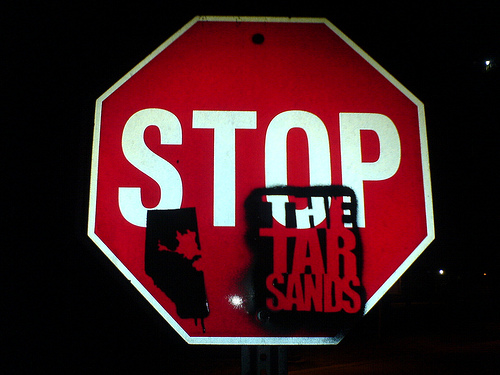Here’s the real news on the big event at the recent Halifax premiers’ conference. It was yet another signal that what we gingerly call the oilsands in Canada, but which the rest of the world — including conservative journals like the Economist — decidedly calls the tarsands, and which are meant to serve as the pillar of the Canadian economy in the Stephen Harper vision, are actually quicksands in both the environmental and economic sense.
B.C.’s dramatic refusal at the conference to accommodate an Alberta pipeline through its territory without big trouble — all the more significant because the tiff is West vs. West, not the usual East vs. West — is the second such rebuff for a bitumen pipeline.
The Keystone XL Pipeline through the U.S. was also blocked for environmental reasons. A new application has been made, but 10 top climate scientists have written to Secretary of State Hillary Clinton asking that the new assessment evaluate not just its effect on aquifers, streams, etc., but ask about the impact on global climate of what is considered the dirtiest single project on earth. The New York Times kicked in with an editorial this week entitled “Canada’s oil, the world’s carbon,” urging the same thing, saying the U.S. must be wary of being “complicit” in pushing climate change further towards its tipping point.
Meanwhile, the context of all this — the U.S. political mood — is changing quickly. This year’s climate mayhem — unusually destructive tornadoes followed by a devastating drought and fires — is dispersing the smog of coal/oil industry-funded denial about climate change. Very quickly, “belief” in global warming — as though it was a matter of belief — has jumped from 50 per cent to over 70 per cent in the polls. There are reports of farmers and farming communities who are facing ruin angry that they were duped about the climate threat and that the political parties are not facing up to it.
Meanwhile, one of the last important climate change skeptics, scientist Richard A. Muller, rattled deniers and believers alike by reporting that climate change is not only real but worse than thought. In one of the most elaborate studies yet, his Berkeley Earth Surface Temperature Project, after discounting the usual objections — sunspots, climate cycles, urban heating, measurement anomalies, etc. — concluded that the temperature has risen 2.5 degrees over the last 250 years, virtually all of it because of human activity, an affirmation that goes beyond the 2007 findings of the UN’s Intergovernmental Panel on Climate Change whose methods had originally left him skeptical.
For the oil/tarsands project to proceed and expand as foreseen, at least with present technology, it must be kept isolated from the global warming issue, which is quickly becoming a food shortage issue as well. Looks like that can’t happen.
Meanwhile, the economics are on shifting sands as well. Oilsands giant Suncor Energy, which was planning a million barrels a day by 2020, is cutting back on tens of billions of dollars in planned investment, triggered by a drop in oil prices. Because bitumen oil is very costly to produce, a price drop kills profits. If prices remain low — because of low world growth, conservation, or substitution for oil by abundant natural gas and other alternatives — the Alberta patch is in trouble.
Will prices remain low (which they are now, in bitumen terms)? If that sounds unlikely, the high price scenario is troubled too. The California-based Post Carbon Institute has just put out a paper showing bitumen oil getting five units of energy from one unit of input (that’s 5-1; conventional oil is 30-1, having declined from its heyday of 100-1). Apart from the fool’s gold that is corn-based ethanol at 1-1 to 2-1, that’s the most expensive energy in the world.
Their senior expert, Richard Heinberg, writes that “if all our energy sources had such a dismal return on energy investment, we’d be producing energy just to fuel the next increment in energy production” with little left for the general economy. Other experts wrote in to question the 5-1, saying it doesn’t take into account the huge amount of trucking, digging, flying and whatnot involved in the enterprise, nor the cheap natural gas used to make expensive oil — all of today’s relatively cheaper, cleaner conventional energy invested into producing tomorrow’s dirty expensive energy.
Meanwhile, Robyn Allan, financial analyst and former CEO of the B.C. Insurance Corp., has produced a report attacking a spate of cheery oil industry-related reports — cited by the Harper government as reasons for development — as “flimsy and one sided” and making ridiculous assumptions about future exchange rates and other factors.
No wonder Prime Minister Harper has turned down the premiers’ invitation to a federal-provincial meeting in November on Canada’s economic future, and done so with his usual lack of grace. Face to face, the going might be just too rough.
Ralph Surette is a veteran freelance journalist living in Yarmouth County. This article was first published in the Chronicle Herald.
Image: someones.life/Flickr



